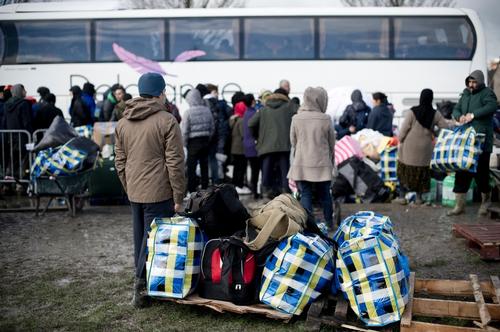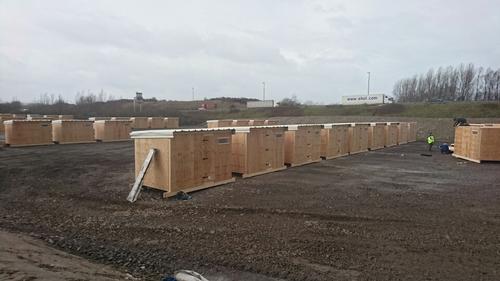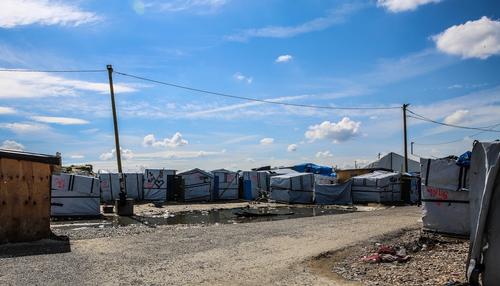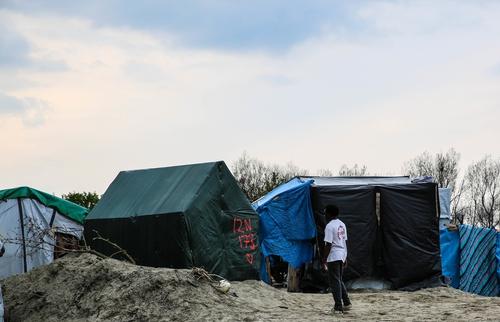A refugee camp was set up in the town of Grande-Synthe on the outskirts of Dunkirk in northern France in 2006. Located in Basroch, a plot of land earmarked for a 500-dewelling eco-neighbourhood, there were never more than a few dozen people at one time in the camp as its residents would move out to make their way illegally to the UK.
However, at the end of last summer the migrant crisis escalated and the number of migrants in the camp grew substantially, from around 100 in August, to 700 in October, 1,000 in November and then over 2,500 (including 200 children) in December.
The majority of the refugees in Basroch were Iraqi Kurds (90%), and the rest were Syrians, Kuwaitis, Afghans, Iranians and a few Vietnamese. None were from Sub-Saharan Africa.
By the autumn, the various associations (Emmaüs, Terre d’Errance, le Secours Catholique et Populaire, etc.) that had been working in the camp for some time were no longer able to cope and could not provide the level of assistance that was required. Other organisations, notably No Borders, began arriving at the camp.
MSF who already conducted an exploratory mission in Basroch in September 2015 and began providing mobile clinics and effecting logistical and sanitation improvements. The organisation then went on to construct a new camp called Linière and the move from Basroch took place between 7 and 9 March.

Basroch camp (now closed)
Hygiene was dire in Basroch camp, and several areas became a muddy quagmire every time it rained. The mayor called it “the camp of shame” and MSF workers described it in interviews as a “gigantic refuse dump”. Given its location, it was impossible to make the improvements needed to better the migrants’ living conditions.
The police allowed almost no building materials into the camp. This limited the putting up of shelters like the ones in Calais and condemned most of the refugees to living through the winter months surrounded by mud and piles of rat-infested rubbish in tents better suited to camping holidays.
Tensions often ran high, and these were exacerbated by bad weather, boredom, the stress of people trying to cross to the UK, a lack of prospects for the future and violence (people smugglers; police). There were some violent incidents during which several people suffered bullet wounds. The police were at the entrance to the camp.
By autumn 2015, not only numerous European organisations but also dozens of independent British, Belgian, German, French and Dutch volunteers were providing assistance.
Several legal specialists gave advice on applying for asylum in France and transferring to reception centres called CAOs and helped families and the most vulnerable to find shelter for the winter months. Between October 2015 and beginning April 2016, 576 people re-located to CAOs, 6 returned to their countries of origin and 108 applied for asylum in France.
MSF’s activities
At the end of 2015, MSF began delivering medical services and logistical assistance while a team of six outreach workers helped to identify the most vulnerable, directing them when necessary to the clinic.
Medical
MSF team provided medical services with Médecins du Monde (MdM) three times a week.
Medical activities from January (week 1) to beginning March (week 9) 2016:
- 1,217 consultations (an average of 50 a day) – including 180 women and 89 children under the age of 5 years – mainly for respiratory infections, but also some scabies and dental problems;
- 165 dressings;
- 110 referrals (28% were children under the age of 5 years, 27% dental emergencies, additional tests and chronic diseases);
After a case of measles was declared, MSF, MDM and EPRUS conducted a vaccination campaign between 16 February and 17 March, starting in Basroch, then at four other small migrant sites. These campaigns were prepared and supervised by MSF. 529 people were vaccinated (82% males and 18% females).
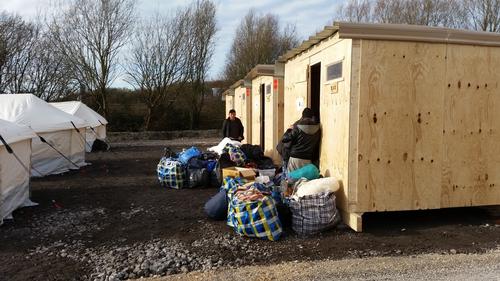
Logistics
- Distribution of NFIs;
- Provision of rubbish containers;
- Installation of 44 indoor chemical WCs, 2 water points and 42 hot showers.
La Linière (new camp)
Informing the migrants on the upcoming move began in January 2016 (information messages, photos of Linière and facilities there, details on the organisation, etc.).
Organised by MSF in cooperation with the municipality, partner associations and the over one hundred volunteers in Basroch, the move took place on 7 March (900 people), 8 March (170 people) and 9 March (206 people). By the evening of 9 March, Basroch camp was completely empty and bulldozing began.
Three weeks after the move was officially completed, various local associations and agencies had initiated numerous projects and improvements to Linière camp (building schools, community kitchens, living spaces, etc.) under the supervision of camp coordinator UTOPIA 56. AFEJI is responsible for maintaining the latrines and showers and, for the time being, asylum applications, departures to CAOs and providing accommodation for the most vulnerable. OFII is also present in the camp. More legal specialists will soon be on hand to provide their services (assistance to unaccompanied minors, family reunification, legal advice, help with and following-up on formal complaints for violence, etc.).
While there continue to be a lot of people arriving and departing (particularly to the UK), numbers have stabilised. As long as there are less than 1,500 people, responsibility for the camp falls to the mayor. Above this number, responsibility falls to the Prefect.
Medical
A key player in the camp in recent weeks, MSF is now taking a step back, deploying less staff, sharing its programmes with other agencies and scaling down logistics activities.
For the most part, there are less of the disorders seen in Basroch camp that were caused by poor living conditions – severe respiratory infections, scabies, burns from makeshift heaters, etc. This decrease is due to improved living conditions but also to the warmer weather as spring arrives.
- OPD 5 days/week in cooperation with MDM and the French Red Cross on weekends ; an average of 40 to 50 consultations/day, with 5 to 10 dressings. The OPD is run jointly with Gynécologie Sans Frontières. Most commonly seen are respiratory infections (50%), dental problems, less scabies and few traumas. People arriving at the camp are vaccinated against measles and tetanus, if they have open wounds. There is little chronic disease. Information on sexually transmitted diseases is provided, condoms are distributed in the OPD & health monitoring is insured.
- A psychiatrist and psychologist give consultations 3 times a week. MDM and CRF provide psychosocial support activities and refer patients to us. Currently 48 psychological consultations/month (expected to increase to 70) for anxiety and depression, patients suffering with psychosis who have interrupted their treatment, some cases of post-traumatic stress disorder.
- Strategy: issue medical certificates for violence and establish in conjunction with our partners (including MDM) treatment protocols for casualties of intra-migrant and police violence; dental care (25% of consultations on average); set up a partnership with state-run mother and child health services to monitor children and their vaccination status
- The teams have started outreach patrols. Focusing on medico-social prevention, they provide information on the health services available at Linière camp.
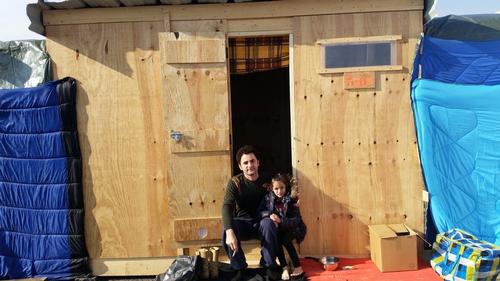
Logistics
While MSF provided most of the funding for Linière camp, the municipality was the second largest contributor. Initially designed to accommodate 2,500 people (roads + sanitation and electricity), the camp’s location is not ideally situated as it is in a windswept area between a railway line and a motorway.
Levelling of the site to prepare it for road, electricity, water supply and drainage infrastructure started on 14 January. The camp is lit.
387 wooden cabins have been constructed. Measuring 8 sq.m and accommodating up to 4 people, each cabin has its own heating. There are also around twenty tents.
Sanitation blocks have been set up in five containers and at long last there are enough showers (66) and toilets (126)!
MSF’s logistics activities – now limited to distributing fuel and maintaining the cabin heaters – are set to end at the end of April.
Budget: €4,500,000€ – €3,000,000 spent on constructing the camp.



